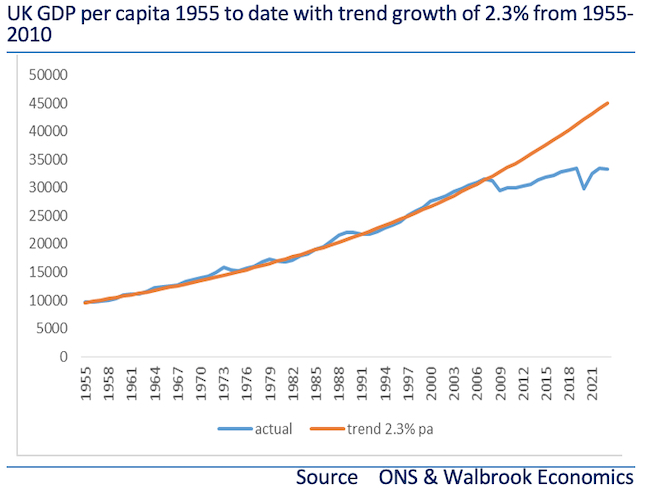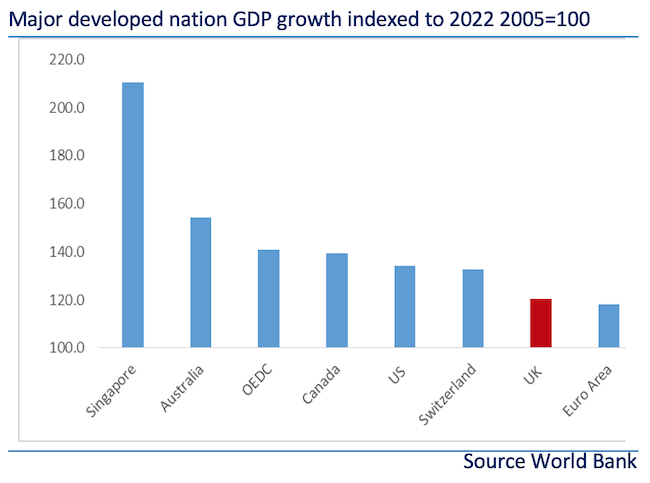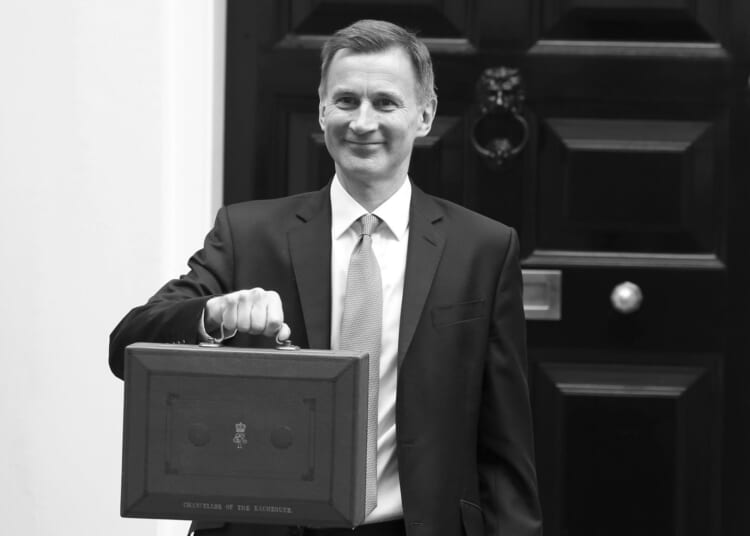LAST WEEK’S Budget has failed. It was timid, did not tackle the critical question of out-of-control public spending and indeed rewarded failure with yet more money for the NHS with no clear productivity improvement targets. ‘Please perform better’ was the message without any route map as to how that might be achieved.
Further, and as a result of a grossly inefficient state, the tax cuts were derisory. Given that personal allowance thresholds continue to be frozen, the total tax take as a proportion of the economy will likely continue to rise. How much is too much, Mr Hunt?
Perhaps worst of all, through ever increasingly generous benefits undermining the work ethic yet further, it encouraged the cautious to not seek work. Just recently the Office for National Statistics (ONS), whose staff are evidently threatening to strike because they have been asked to come into their workplace two days a week, increased its estimates of the long term workshy from around 8million to 9.2million. That is not far off a quarter of the workforce, making a mockery of the official statistic of just 3.9 per cent unemployed.
Did Jeremy Hunt try to address this? Quite the opposite – benefits are rising further. This is economic stupidity.
Hunt and Sunak simply fail to understand the gravity of the situation, meekly appeasing all around. Not only will such appeasement fail economically, it will fail politically as neither the recipients of public largesse, nor the hard-pressed who pay for this failure, will be remotely happy. And so it seems, if opinion polls in reaction to the Budget are to be believed.
The British tragedy, however, is the Labour Party’s prognosis will compound the problem. They will likely double down on every abject failure this notionally Conservative Government has inflicted on the nation with even higher tax, spending, regulation and redistribution.
Let’s examine what has happened under Conservative rule over the last 14 years and try to navigate the likely Labour response.
It is a matter of fact that in 2010 taxes were 32.4 per cent of GDP. The OBR estimates taxes are now the highest since 1948 at over 36 per cent of GDP today.
Public spending was 40 per cent of GDP in 2010, up from 32 per cent just ten years earlier. Now, in 2024, it is not far from half of the entire economy.
The national debt was £1,100billion in 2010. It is over £2,700billion today. The rate of change in each instance is greater than any European nation save Greece and Cyprus.
The results have been woeful in almost every respect from NHS GP availability, to waiting lists, from the size and potency of the armed forces to infrastructure capacity and effectiveness and from the crime rate to energy security and efficiency.
Perhaps even more significant, however, has been the loss of personal liberty as politics has moved from merely an economic debate into one encompassing almost every sphere of life. It has moved well into the private sphere, curtailing family choice in a manner that would have been unthinkable a decade ago.
Economic growth per head as a direct result of these policies has been, without exaggeration, the worst on a per capita basis in two hundred years. As a reminder, between 1955 and 2010 per capita GDP growth consistently averaged 2.3 per cent. Since 2010 it has averaged 1 per cent. And over the last six years it’s been virtually zero. The difference between 2.3 per cent and 1 per cent may not sound much, but the compound effect is immense.
As outlined by the chart below, if growth since 2010 had averaged the long term trend, per capita income today would have been £45,062, not the current £33,271 – a staggering £12,000 per person of lost opportunity. The cake is relatively smaller, liberty is reduced and the risk of material instability is growing.

This is a British (and European) failure. Every other developed region has done so much better, manifestly so. It is simply untrue to argue this is a developed nation issue, as the chart below indicates. It is simply down to making very poor policy choices.

Tragically, however, Labour have in almost every respect argued it’s not enough. Their leaders have consistently proposed even more extreme measures. Labour claim the NHS is underfunded. They refuse to say whether 1.4million visas granted is acceptable or not, with the strong suspicion being they will continue a near open border policy.
They supported in lockstep the catastrophic lockdown which has impoverished the nation in so many ways (of which economic is merely one) and almost certainly would have been even more draconian. They cheered for woke (which is perhaps more honest than the Conservative wailing), but in reality do nothing and often support attacks on private thought.
While I suspect Rachael Reeves will be constrained in her spending plans, Labour’s solutions will further weaken an already unsustainable trend. Reeves says there will be no wealth taxes, but watch out for council tax revaluations leading to far higher bills for many, a cap on pension provision and of course a vindictive attack on private education. Beware – you may or may not have children impacted by higher school fees courtesy of VAT on private schools, but don’t celebrate because what you like may well be next.
They will tax and control; doubling down on net zero, employment, equality and energy regulation, further creating confusion, expediency and arbitrary Government. Planning and decision-making in this environment is near impossible, so prosperity will wither. While on migration and woke the Conservatives talk the talk and then do nothing, Labour generally believe in the revolutionary remodelling of our society, so my guess is you’ve seen nothing yet.
Just as Labour embedded their ideas in quangocracy, legal tripwires and institutions deeply hostile to liberty, now they will likely take interventions to a new level. Their ideas for local democracy are mad and bad. Devolution in London, Wales and Scotland has been a disaster, embedding extreme and illiberal ideas. Labour’s proposal is to create yet more Government at regional level throughout the UK, encouraging division, embedding bureaucracy and creating regional Soviets up and down the land, pitching shire against inner city. The definition of insanity is to keep on repeating previous failed ideas as if eventually they will throw up the right answer.
This country is facing a crisis, economic, cultural and moral. The Conservative Party have abjectly failed by adopting hard left ideas. The expansion of the State, not just in raw numbers but in regulation and control is far more extreme than anything Jeremy Corbyn had the temerity to propose.
Starmer and Reeves might appear softer in appearance than Corbyn and McDonnell, but their cloaked pronouncements so far, in almost every case, have been even harder-edged versions of the failed policies of the so-called Conservative Party.
Ultimately a crisis is coming.
The laws of economics can be trashed for only so long. The tragedy is that remedy is not difficult but time is short. Another five years of creating a client state and it may simply be too late to remedy.
Our brightest and best are leaving. University quotas are causing many to seek university education abroad; some will never return.
The UK saw the third largest net migration away of millionaires in 2023: a larger absolute number quit the UK than quit Russia under the sanctions it faces, and proportionally three times as great a loss. If that’s not bad enough, the UK is officially the world’s second most miserable country, with only Uzbekistan performing worse. An extraordinary fall for a nation that has given the world so much.
Our debate is delusional but whether our elite like it or not, slowly but surely the people of this country are losing confidence in those who govern us, while global capital is losing confidence too. The situation is highly fragile with the top 1 per cent paying 27 per cent of the income tax base. Not many need to leave to cause severe problems, if not to collapse this house of cards.
This article appeared in Global Britain and is republished by kind permission.











